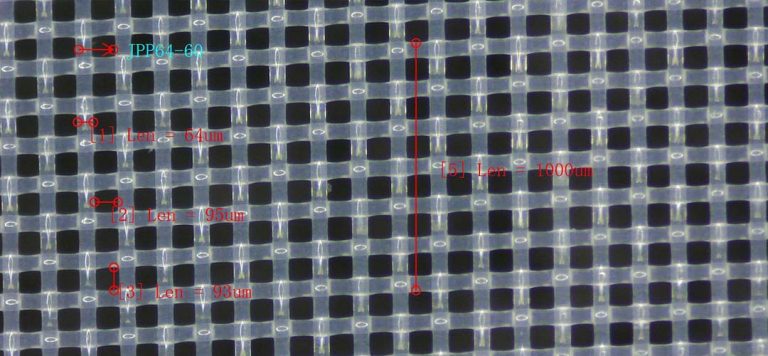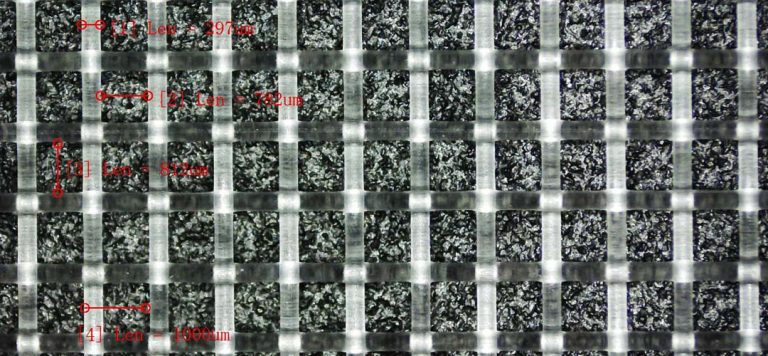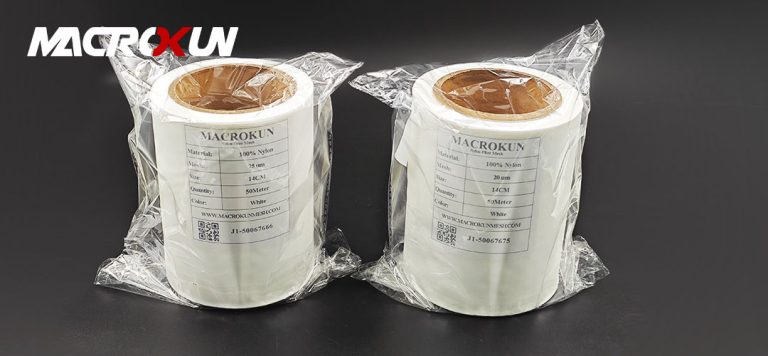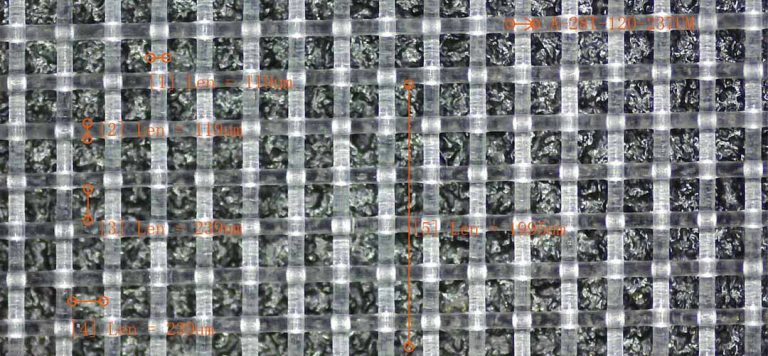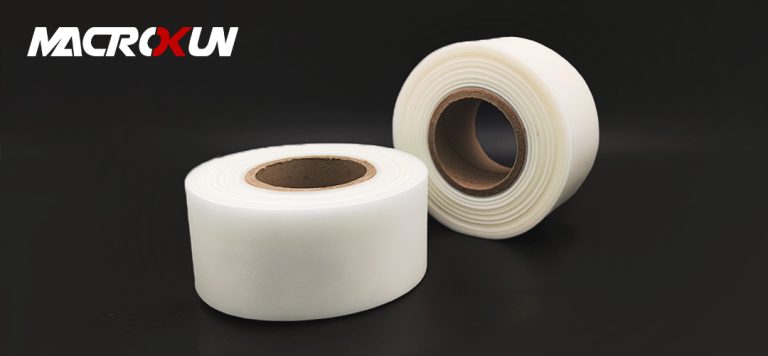Table of Contents
Benefits of Using fine nylon mesh in Filtration Systems
Fine nylon mesh is a versatile material that is commonly used in filtration systems due to its numerous beneficial features. In this article, we will explore the various advantages of using fine nylon mesh in filtration systems and how it can improve the efficiency and effectiveness of the filtration process.
| Model | Mesh Count (/cm) |
Mesh Count (/inch) |
Thread Dia (um) |
Mesh Opening (um) |
Thickness (um) |
Weight (g/m2) |
| NL4/1950 | 4 | 10 | 550 | 1950 | 1100 | 307 |
| NL5/1500 | 5 | 13 | 500 | 1500 | 1000 | 318 |
| NL6/1267 | 6 | 15 | 400 | 1267 | 800 | 244 |
| NL7/1079 | 7 | 18 | 350 | 1079 | 700 | 218 |
| NL8/900 | 8 | 20 | 350 | 900 | 700 | 249 |
| NL9/861 | 9 | 23 | 250 | 861 | 500 | 143 |
| NL9/811 | 9 | 23 | 300 | 811 | 600 | 206 |
| NL10/750 | 10 | 25 | 250 | 750 | 500 | 159 |
| NL10/700 | 10 | 25 | 300 | 700 | 600 | 229 |
| NL12/583 | 12 | 30 | 250 | 583 | 500 | 191 |
| NL12/533 | 12 | 30 | 300 | 533 | 600 | 274 |
| NL14/514 | 14 | 36 | 200 | 514 | 340 | 142 |
| NL16/425 | 16 | 40 | 200 | 425 | 340 | 160 |
| NL20/350 | 20 | 50 | 150 | 350 | 255 | 113 |
| NL20/300 | 20 | 50 | 200 | 300 | 340 | 200 |
| NL24/267 | 24 | 60 | 150 | 267 | 255 | 135 |
| NL28/237 | 28 | 70 | 120 | 237 | 204 | 101 |
| NL30/213 | 30 | 76 | 120 | 213 | 204 | 110 |
| NL32/213 | 32 | 80 | 100 | 213 | 170 | 80 |
| NL36/178 | 36 | 90 | 100 | 178 | 170 | 90 |
| NL40/150 | 40 | 100 | 100 | 150 | 170 | 100 |
| NL43/153 | 43 | 110 | 80 | 153 | 136 | 70 |
| NL48/128 | 48 | 120 | 80 | 128 | 136 | 77 |
| NL56/119 | 56 | 140 | 60 | 119 | 102 | 50 |
| NL64/96 | 64 | 160 | 60 | 96 | 102 | 58 |
| NL72/89 | 72 | 180 | 50 | 89 | 85 | 45 |
| NL80/75 | 80 | 200 | 50 | 75 | 85 | 50 |
| NL100/57 | 100 | 250 | 43 | 57 | 73 | 46 |
| NL110/48 | 110 | 280 | 43 | 48 | 73 | 52 |
| NL120/48 | 120 | 300 | 35 | 48 | 60 | 37 |
| NL120/40 | 120 | 300 | 43 | 40 | 73 | 55 |
| NL130/42 | 130 | 330 | 35 | 42 | 60 | 40 |
| NL130/34 | 130 | 330 | 43 | 34 | 73 | 61 |
| NL140/36 | 140 | 350 | 35 | 36 | 60 | 43 |
| NL157/25 | 157 | 400 | 43 | 25 | 73 | 74 |
| NL180/20 | 180 | 450 | 39 | 20 | 66 | 68 |
| NL200/15 | 200 | 500 | 39 | 15 | 66 | 76 |
| NL220/10 | 220 | 550 | 39 | 10 | 66 | 84 |
| NL240/5 | 240 | 600 | 39 | 5 | 66 | 91 |
One of the key benefits of using fine nylon mesh in filtration systems is its excellent filtration capabilities. The fine mesh size of nylon allows it to effectively capture and retain particles of various sizes, ranging from large debris to microscopic contaminants. This makes nylon mesh an ideal choice for applications where high levels of filtration are required, such as in water treatment plants, pharmaceutical manufacturing, and food processing.
In addition to its superior filtration capabilities, fine nylon mesh is also highly durable and long-lasting. Nylon is a strong and resilient material that can withstand harsh operating conditions, including high temperatures, chemicals, and abrasion. This durability ensures that the mesh will not degrade or break down over time, allowing for consistent and reliable filtration performance.
Furthermore, fine nylon mesh is lightweight and flexible, making it easy to handle and install in filtration systems. Its flexibility allows the mesh to conform to the shape of the filtration system, ensuring a tight and secure fit that prevents bypass and ensures efficient filtration. Additionally, the lightweight nature of nylon mesh reduces the overall weight of the filtration system, making it easier to transport and install.

Another advantage of using fine nylon mesh in filtration systems is its resistance to clogging. The fine mesh size of nylon prevents particles from becoming trapped and accumulating on the surface of the mesh, which can lead to clogging and reduced filtration efficiency. This resistance to clogging ensures that the filtration system operates at optimal performance levels, providing consistent and reliable filtration results.
Additionally, fine nylon mesh is easy to clean and maintain, further enhancing its usability in filtration systems. The smooth surface of nylon allows for easy removal of trapped particles and contaminants, making it simple to clean the mesh and restore it to its original filtration capacity. This ease of maintenance reduces downtime and ensures that the filtration system remains operational and efficient.
In conclusion, the features of fine nylon mesh make it an ideal choice for filtration systems in a wide range of applications. Its excellent filtration capabilities, durability, flexibility, resistance to clogging, and ease of maintenance all contribute to its effectiveness and efficiency in capturing and retaining particles. By utilizing fine nylon mesh in filtration systems, industries can improve the quality of their products, reduce maintenance costs, and enhance overall operational efficiency.
How Fine Nylon Mesh Improves Filtration Efficiency
Nylon mesh is a versatile material that is commonly used in filtration systems due to its durability, flexibility, and fine mesh size. Fine nylon mesh is particularly effective in improving filtration efficiency, as it can capture even the smallest particles while allowing for optimal flow rates. In this article, we will explore the features of fine nylon mesh that make it an ideal choice for filtration systems.
One of the key features of fine nylon mesh is its high tensile strength, which allows it to withstand high pressures and temperatures without losing its shape or integrity. This makes it suitable for use in a wide range of filtration applications, from industrial processes to medical devices. Additionally, nylon mesh is resistant to chemicals and abrasion, making it a durable and long-lasting filtration material.
Another important feature of fine nylon mesh is its uniform mesh size, which can be customized to meet specific filtration requirements. The fine mesh size of nylon allows for the efficient capture of particles as small as a few microns, ensuring that the filtration system can effectively remove contaminants from the fluid or gas being filtered. This level of precision in particle capture is essential for industries such as pharmaceuticals, food and beverage, and electronics manufacturing, where even the smallest impurities can have a significant impact on product quality.
In addition to its high tensile strength and uniform mesh size, fine nylon mesh is also lightweight and easy to handle, making it easy to install and replace in filtration systems. This ease of use is important for industries that require frequent filter changes or maintenance, as it can help reduce downtime and increase overall efficiency. Furthermore, nylon mesh is washable and reusable, allowing for cost-effective filtration solutions that are environmentally friendly.
One of the key benefits of using fine nylon mesh in filtration systems is its high flow rate, which allows for fast and efficient filtration of fluids and gases. The open weave structure of nylon mesh enables a high flow rate while still maintaining excellent particle capture efficiency, making it an ideal choice for applications where both speed and accuracy are important. This combination of high flow rate and fine particle capture makes fine nylon mesh a versatile and effective filtration material for a wide range of industries.
In conclusion, fine nylon mesh offers a range of features that make it an ideal choice for filtration systems looking to improve efficiency and performance. Its high tensile strength, uniform mesh size, and lightweight design make it a durable and easy-to-use material for capturing small particles while maintaining a high flow rate. Whether used in industrial processes, medical devices, or consumer products, fine nylon mesh is a reliable and cost-effective solution for achieving optimal filtration results.
Different Types of Fine Nylon Mesh for Various Filtration Needs
Fine nylon mesh is a versatile material that is commonly used in filtration systems to separate particles from liquids or gases. Its unique properties make it an ideal choice for a wide range of applications, from industrial processes to medical devices. In this article, we will explore the features of fine nylon mesh and discuss the different types available for various filtration needs.
One of the key features of fine nylon mesh is its durability. Nylon is a strong and resilient material that can withstand high temperatures and harsh chemicals without degrading. This makes it an excellent choice for filtration systems that are exposed to challenging conditions. Additionally, nylon mesh is resistant to abrasion and tearing, ensuring that it will maintain its integrity over time.
Another important feature of fine nylon mesh is its flexibility. Nylon mesh can be easily molded and shaped to fit different filtration systems, making it a versatile option for a variety of applications. Whether you need a flat sheet of mesh or a cylindrical filter, nylon can be customized to meet your specific requirements.
In addition to its durability and flexibility, fine nylon mesh is also known for its excellent filtration properties. Nylon mesh is available in a range of pore sizes, allowing you to choose the right mesh for your specific filtration needs. Whether you are filtering out large particles or capturing tiny contaminants, there is a nylon mesh that is suitable for the job.
There are several different types of fine nylon mesh available for various filtration needs. Monofilament nylon mesh is a popular choice for applications that require high flow rates and minimal clogging. This type of mesh is made from a single strand of nylon, resulting in a smooth surface that allows liquids or gases to pass through easily.
Another type of fine nylon mesh is multifilament nylon mesh, which is made from multiple strands of nylon twisted together. This type of mesh is more rigid than monofilament mesh, making it ideal for applications that require extra support or stability. Multifilament nylon mesh is often used in applications where fine filtration is required, such as in medical devices or laboratory equipment.
In addition to monofilament and multifilament nylon mesh, there are also specialty nylon meshes available for specific filtration needs. For example, conductive nylon mesh is designed for applications that require static dissipation, while hydrophilic nylon mesh is ideal for filtering water-based liquids. By choosing the right type of nylon mesh for your filtration system, you can ensure optimal performance and efficiency.
In conclusion, fine nylon mesh is a versatile and reliable material that is well-suited for a wide range of filtration applications. Its durability, flexibility, and excellent filtration properties make it an ideal choice for industrial processes, medical devices, and other filtration systems. By exploring the features of fine nylon mesh and understanding the different types available, you can select the right mesh for your specific filtration needs and achieve optimal results.
Maintenance Tips for Fine Nylon Mesh in Filtration Systems
Fine nylon mesh is a popular choice for filtration systems due to its durability, flexibility, and effectiveness in capturing small particles. This type of mesh is commonly used in a variety of industries, including pharmaceuticals, food and beverage, and water treatment. In order to maintain the efficiency of a filtration system using fine nylon mesh, it is important to understand its features and how to properly care for it.
One of the key features of fine nylon mesh is its ability to trap particles as small as a few microns in size. This makes it ideal for applications where high levels of filtration are required, such as in clean rooms or laboratories. The tight weave of the mesh ensures that even the smallest particles are captured, resulting in a cleaner end product.
Another important feature of fine nylon mesh is its flexibility. This type of mesh can be easily molded to fit different shapes and sizes, making it versatile for a wide range of filtration applications. Whether it is used in a cartridge filter, bag filter, or screen filter, fine nylon mesh can be customized to meet the specific needs of the system.
In order to maintain the effectiveness of fine nylon mesh in a filtration system, it is important to regularly clean and inspect the mesh. Over time, particles can build up on the surface of the mesh, reducing its ability to capture new particles. By cleaning the mesh regularly, either through backwashing or chemical cleaning, the filtration system can continue to operate at peak efficiency.

In addition to cleaning, it is also important to inspect the mesh for any signs of wear or damage. Fine nylon mesh can become stretched or torn over time, especially in high-pressure applications. By regularly inspecting the mesh for any signs of damage, it is possible to prevent leaks or other issues that could compromise the filtration system.
When cleaning fine nylon mesh, it is important to use the proper techniques and cleaning agents. Harsh chemicals or abrasive cleaning methods can damage the mesh, reducing its effectiveness and lifespan. Instead, it is recommended to use mild detergents or specialized cleaning solutions designed for nylon mesh.
In conclusion, fine nylon mesh is a versatile and effective material for filtration systems. By understanding its features and how to properly care for it, it is possible to maintain the efficiency of a filtration system using fine nylon mesh. Regular cleaning and inspection are key to ensuring that the mesh continues to capture particles effectively and prevent any issues that could compromise the system. With proper maintenance, fine nylon mesh can provide reliable filtration for a wide range of applications.
Applications of Fine Nylon Mesh in Industrial Filtration Systems
Fine nylon mesh is a versatile material that has found a wide range of applications in industrial filtration systems. Its unique properties make it an ideal choice for filtering out particles of various sizes, making it an essential component in many industries. In this article, we will explore the features of fine nylon mesh and its applications in industrial filtration systems.
One of the key features of fine nylon mesh is its durability. Nylon is a strong and resilient material that can withstand high temperatures and harsh chemicals, making it suitable for use in demanding industrial environments. This durability ensures that the mesh can effectively filter out particles without being damaged or degraded over time.
In addition to its durability, fine nylon mesh also offers excellent filtration capabilities. The mesh is woven tightly to create a fine network of pores that can capture particles of various sizes. This makes it an effective filter for removing contaminants from liquids and gases, ensuring that the final product meets the required quality standards.
Another important feature of fine nylon mesh is its flexibility. The mesh can be easily cut and shaped to fit different filtration systems, making it a versatile option for a wide range of applications. Whether it is used in a liquid filtration system or a gas filtration system, fine nylon mesh can be customized to meet the specific requirements of the process.
Furthermore, fine nylon mesh is easy to clean and maintain. Unlike some other types of filters that require frequent replacement, nylon mesh can be cleaned and reused multiple times without losing its effectiveness. This not only reduces maintenance costs but also minimizes waste, making it a more sustainable option for industrial filtration systems.
The applications of fine nylon mesh in industrial filtration systems are diverse. In the food and beverage industry, nylon mesh is used to filter out impurities from liquids such as juices, wines, and dairy products. Its fine pores can capture bacteria and other contaminants, ensuring that the final product is safe for consumption.
In the pharmaceutical industry, fine nylon mesh is used to filter out particles from drug formulations and sterile solutions. The mesh can remove impurities that could affect the efficacy of the medication, ensuring that it meets the required quality standards. This is crucial in ensuring the safety and effectiveness of pharmaceutical products.
In the chemical and petrochemical industries, fine nylon mesh is used to filter out contaminants from liquids and gases. The mesh can capture particles such as rust, scale, and debris, preventing them from damaging equipment or affecting the quality of the final product. This helps to maintain the efficiency and reliability of industrial processes.

Overall, fine nylon mesh is a valuable component in industrial filtration systems. Its durability, filtration capabilities, flexibility, and ease of maintenance make it an ideal choice for a wide range of applications. Whether it is used in the food and beverage industry, pharmaceutical industry, or chemical industry, fine nylon mesh plays a crucial role in ensuring the quality and safety of products.

